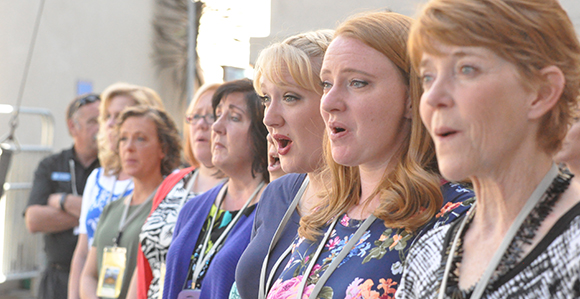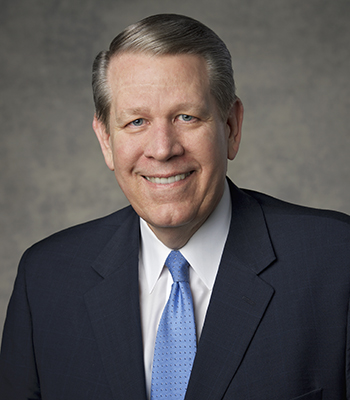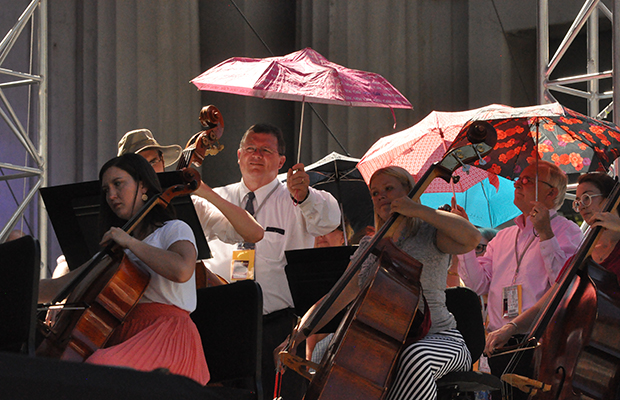Seventy Shares Tips for “Living a Reverent Life” with Mormon Tabernacle Choir
Contributed By Jason Swensen, Church News Associate editor

Members of the Mormon Tabernacle Choir rehearse in Berkeley, California, during the ongoing 2018 Classic Coast Tour. Sunday, June 24, gave the touring performers an opportunity to worship together.
Article Highlights
- A reverent life is a lifelong endeavor to live “consistent with what we believe.”
- You should find reverence in public, family, and personal worship.
“I really looked forward to having this sacrament meeting together. It’s different than anything else we do together.” —Jana Ellsworth, choir member
Related Links
SAN FRANCISCO
Elder Donald L. Hallstrom’s paternal grandparents always called their grandson “Don”—except once each year during the last season of their lives.
When it was time for Brother and Sister Hallstrom to renew their temple recommends, they would call their grandson who was also presiding over their ward.
“My grandfather would say, ‘Bishop, we need to have an interview,’” remembered Elder Hallstrom, a General Authority Seventy, during a special sacrament meeting June 24 for participants of the 2018 Classic Coast Tour of the Mormon Tabernacle Choir and Orchestra at Temple Square.
Elder Hallstrom’s grandparents were not well at the time. They were battling the challenges of age. They didn’t have the strength to visit the temple. But for the elder Hallstroms, holding a current recommend represented far more than an admission pass to enter a temple.
“It was a symbol to the Lord that they were living true to the commandments,” he said. They were committed to a “reverent” life that blessed them and their families.

Elder Donald L. Hallstrom, a General Authority Seventy, is accompanying the Mormon Tabernacle Choir and the Orchestra at Temple Square for part of its 2018 Classic Coast Tour.
Elder Hallstrom and his wife, Sister Diane Hallstrom, are accompanying the choir and orchestra for the first segment of the ongoing tour traveling north up the Pacific Coast. They were both speakers Sunday at the sacrament service held in a San Francisco ballroom.
Attending sacrament meeting with hundreds of first-class performers makes for an unforgettable Sabbath day gathering. Joining the “congregation” in singing the opening hymn—“America the Beautiful”—is a singular experience that, well, can’t be duplicated in any typical sacrament meeting.
Choir member Tim Pew of Cedar Hills agreed that worshipping alongside his fellow performers made for a unique sacrament service.
Serving in the choir or orchestra is a “missionary experience,” he said after the meeting. “So anything that happens to strengthen the Spirit, such as this meeting today, is very helpful as we work to connect with our audiences.”
Seek to live “a reverent life,” challenged Elder Hallstrom in his remarks.
Reverence goes far beyond merely being quiet, he explained. In some settings, reverence may not even involve silence or whispers. Instead, it is a lifelong endeavor to live a life “consistent with what we believe.”
So how does one live a reverent life? Elder Hallstrom offered three suggestions.
First, find reverence in public worship
Be part of a “community of Saints” that strengthens each other, prays together, and sings the hymns of Zion together.
Elder Hallstrom warned against tuning out a speaker or teacher who is not well versed, accomplished, or entertaining. Instead, look for opportunities to learn and support.
And be judicious in using electronic devices during Sunday meetings. Cell phones and tablets can be powerful gospel study tools—but, when used casually, they also “give us opportunities to be somewhere else,” he said.
Second, find reverence in family worship
The gospel’s most important lessons are taught in the home. Parents can’t abdicate that essential duty to Primary or other youth leaders.
The ward or branch “should be a second witness to what we teach in the home,” said Elder Hallstrom.
It is essential that young men and young women preparing for, say, missions, marriage, schooling, and careers are having spiritual experiences in their homes.
Third, find reverence in personal worship
Personal prayer and personal scripture study allow God’s children to approach Him “one by one.” When an individual is humble and repents, he or she can take upon himself or herself the name of Jesus Christ, he said.
Elder Hallstrom warned of forgetting “essential” things while pursuing “good” things. Discovering the essential things of life comes only through reverent living.
The choir and orchestra, he added, are “treasures to this Church.” Each is far more than a collection of talented performers. They are “vehicles of the Spirit” that teach and testify of Christ.
Elder Hallstrom thanked the Choir and Orchestra for making sacrifices to be on tour. “You are here because you love what you do.”
The scriptures are filled with references to the heart, taught Sister Hallstrom. A “broken” and a pure heart, she said, “seeks to be humble and yearns to be taught by the Spirit.”
It is the disciples’ challenge to keep hearts close to the Spirit. Those who give their heart to Christ are never alone in their journey.
It is not enough to simply know of Christ, she said. “We should hunger and thirst to seek after and become like our Savior.”
Choir member Jana Ellsworth of Lehi said the Hallstroms counsel was a big boost. The tour can be long and exhausting. It’s easy to get homesick. But sharing the sacrament and worshipping alongside her fellow performers provided a perfect boost.
“I really looked forward to having this sacrament meeting together,” she said. “It’s different than anything else we do together.”

Volunteers form an “umbrella brigade” to provide shade to members of the Orchestra at Temple Square during a rehearsal in Berkeley, California. The performers took a break from touring on June 24, 2018, for Sabbath services. Photo courtesy of the Mormon Tabernacle Choir.
